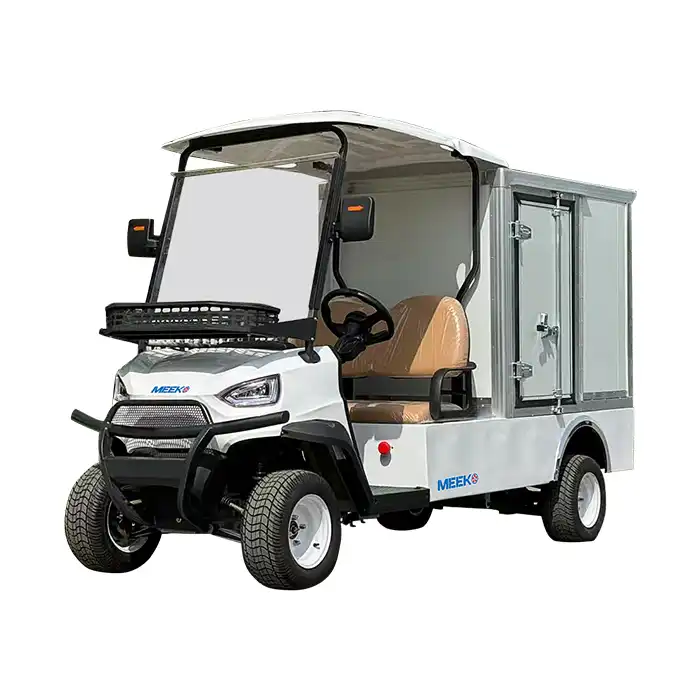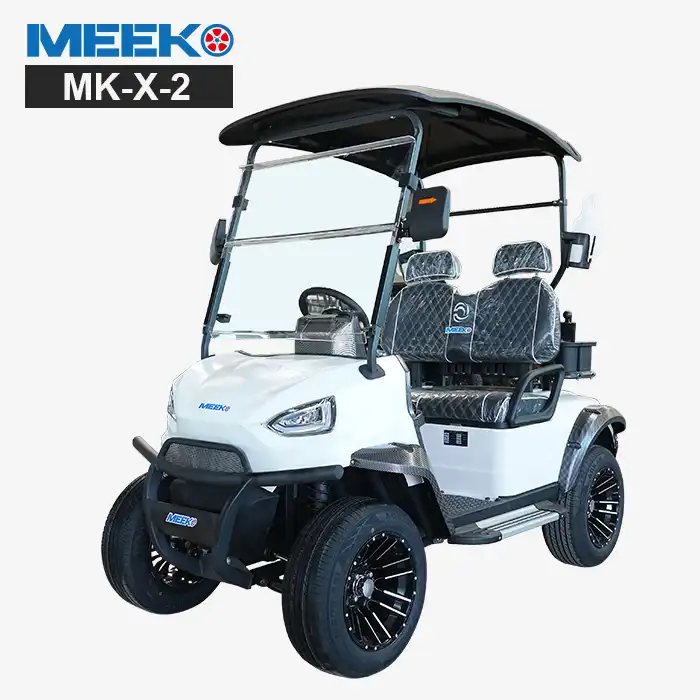Maximizing efficiency with an 8 seater golf cart fleet requires a comprehensive approach that encompasses strategic deployment, preventive maintenance, and technology integration. By implementing zone-based transportation systems, dynamic routing algorithms, and advanced fleet management platforms, operators can achieve significant improvements in operational efficiency and customer satisfaction. The combination of high-quality components, proactive maintenance protocols, and smart energy management ensures long-term fleet reliability and cost-effectiveness. These principles equally apply to golf carts for sale 8 seater units, making them a valuable investment for organizations seeking to optimize group transportation solutions.
- English
- French
- German
- Portuguese
- Spanish
- Russian
- Japanese
- Korean
- Arabic
- Greek
- German
- Turkish
- Italian
- Danish
- Romanian
- Indonesian
- Czech
- Afrikaans
- Swedish
- Polish
- Basque
- Catalan
- Esperanto
- Hindi
- Lao
- Albanian
- Amharic
- Armenian
- Azerbaijani
- Belarusian
- Bengali
- Bosnian
- Bulgarian
- Cebuano
- Chichewa
- Corsican
- Croatian
- Dutch
- Estonian
- Filipino
- Finnish
- Frisian
- Galician
- Georgian
- Gujarati
- Haitian
- Hausa
- Hawaiian
- Hebrew
- Hmong
- Hungarian
- Icelandic
- Igbo
- Javanese
- Kannada
- Kazakh
- Khmer
- Kurdish
- Kyrgyz
- Latin
- Latvian
- Lithuanian
- Luxembou..
- Macedonian
- Malagasy
- Malay
- Malayalam
- Maltese
- Maori
- Marathi
- Mongolian
- Burmese
- Nepali
- Norwegian
- Pashto
- Persian
- Punjabi
- Serbian
- Sesotho
- Sinhala
- Slovak
- Slovenian
- Somali
- Samoan
- Scots Gaelic
- Shona
- Sindhi
- Sundanese
- Swahili
- Tajik
- Tamil
- Telugu
- Thai
- Ukrainian
- Urdu
- Uzbek
- Vietnamese
- Welsh
- Xhosa
- Yiddish
- Yoruba
- Zulu
How to Maximize Efficiency with an 8 Seater Golf Cart Fleet?
Managing large-scale operations requires strategic transportation solutions that balance capacity, efficiency, and cost-effectiveness. Whether you're overseeing a sprawling golf course, managing a luxury resort, or coordinating transportation at expansive venues, optimizing your fleet operations is crucial for success. This comprehensive guide explores proven strategies to maximize efficiency with an 8 seater golf cart fleet, covering everything from strategic deployment and maintenance protocols to technological integration and performance optimization. Operating an efficient transportation fleet demands careful consideration of passenger capacity, operational costs, and service quality. The key to maximizing efficiency lies in understanding how to leverage the unique advantages of high-capacity vehicles while implementing systematic approaches to fleet management. An 8 seater golf cart offers exceptional versatility, allowing operators to transport larger groups while reducing the total number of vehicles needed, thereby streamlining operations and minimizing overhead costs. By implementing strategic planning, regular maintenance schedules, and performance monitoring systems, fleet managers can achieve significant improvements in operational efficiency, customer satisfaction, and profitability.
Strategic Fleet Deployment and Route Optimization
Implementing Zone-Based Transportation Systems
Effective fleet management begins with establishing strategic deployment zones that maximize coverage while minimizing operational overlap. When implementing an 8 seater golf cart system, dividing your operational area into distinct zones allows for more efficient resource allocation and improved response times. Each zone should be sized appropriately to accommodate the range capabilities of your eight seat golf cart fleet, typically covering areas within a 75-kilometer radius to ensure optimal battery performance and minimal downtime. The zone-based approach enables fleet managers to assign specific vehicles to predetermined areas, reducing unnecessary travel distances and improving overall efficiency. By analyzing traffic patterns, peak usage times, and passenger demand data, operators can strategically position their eight person golf cart units to minimize wait times and maximize passenger throughput. This systematic approach also facilitates better maintenance scheduling, as vehicles can be rotated between zones during service periods without disrupting overall operations. Modern GPS tracking systems integrated with fleet management software provide real-time visibility into vehicle locations and operational status. This technology enables dispatchers to make informed decisions about vehicle deployment, ensuring that golf car 8 seater units are positioned optimally to meet passenger demand. Additionally, zone-based systems allow for more effective staff training, as operators become familiar with specific routes and can provide better customer service through enhanced local knowledge.
Dynamic Routing and Demand Forecasting
Advanced routing algorithms combined with historical usage data enable fleet managers to predict passenger demand patterns and adjust deployment strategies accordingly. By analyzing factors such as weather conditions, seasonal variations, and special events, operators can optimize their golf carts for sale 8 seater deployment to match anticipated demand fluctuations. This proactive approach prevents overdeployment during low-demand periods and ensures adequate coverage during peak times. Dynamic routing systems continuously evaluate traffic conditions, passenger requests, and vehicle availability to generate optimal route assignments. These systems can significantly reduce travel times and improve passenger satisfaction by minimizing delays and ensuring efficient pickup and drop-off sequences. The implementation of smart routing technology allows 8 seater golf cart fleets to adapt to changing conditions in real-time, maintaining high service levels even during unexpected demand spikes. Demand forecasting models incorporate multiple variables including historical usage patterns, weather forecasts, and scheduled events to predict future transportation needs. By utilizing these predictions, fleet managers can pre-position their eight seat golf cart vehicles in high-demand areas, reducing response times and improving overall operational efficiency. This predictive approach also enables better staff scheduling and resource allocation, ensuring that adequate personnel are available during peak operational periods.
Load Balancing and Capacity Management
Effective capacity management involves optimizing passenger loads to maximize vehicle utilization while maintaining service quality standards. The 8 seater configuration provides excellent flexibility for accommodating various group sizes, from small parties to full-capacity loads. By implementing smart booking systems and passenger management protocols, operators can achieve higher average occupancy rates while reducing the total number of trips required. Load balancing strategies consider factors such as passenger destinations, travel times, and comfort requirements to optimize seating arrangements and route efficiency. Advanced booking systems can automatically group passengers with similar destinations, maximizing the efficiency of each eight person golf cart trip while minimizing individual travel times. This approach reduces fuel consumption, extends battery life, and improves overall fleet productivity. Capacity management also involves implementing flexible scheduling systems that can accommodate varying demand patterns throughout the day. By analyzing passenger flow data and adjusting service frequencies accordingly, operators can maintain optimal utilization rates while avoiding overcrowding or underutilization. This dynamic approach ensures that golf car 8 seater vehicles are deployed efficiently across all operational periods, maximizing return on investment and improving customer satisfaction.
Maintenance Excellence and Fleet Longevity
Preventive Maintenance Protocols
Establishing comprehensive preventive maintenance programs is essential for maximizing the operational lifespan and efficiency of your 8 seater golf cart fleet. Regular maintenance schedules should include daily inspections, weekly component checks, and monthly comprehensive evaluations to identify potential issues before they result in costly breakdowns or safety concerns. The advanced components used in modern eight seat golf cart vehicles, including the DPD motor systems and lithium battery technology, require specialized maintenance procedures to ensure optimal performance. Daily maintenance routines should focus on critical safety systems including brake performance, steering responsiveness, and lighting functionality. The McPherson independent suspension system requires regular inspection for wear indicators and proper alignment to maintain ride quality and handling characteristics. Battery maintenance protocols must address both lead-acid and lithium configurations, with specific attention to charging cycles, terminal corrosion, and electrolyte levels where applicable. Weekly maintenance procedures should include comprehensive inspections of the electrical system, including the Enpower soft start controller and all LED lighting components. The single-stage rack and pinion steering system with automatic rocker compensating function requires periodic lubrication and alignment checks to maintain precise handling characteristics. Additionally, the PP plastic body components and Glasurit paint finish should be inspected for damage and cleaned using appropriate products to maintain aesthetic appeal and structural integrity.
Component Quality and Reliability Standards
The selection of high-quality components significantly impacts fleet efficiency and maintenance requirements. Modern 8 seater golf cart designs incorporate premium components such as the famous brand DPD electric motors rated from 3.5KW to 7.5KW, providing exceptional power delivery and reliability. These motors are designed to handle the increased demands of eight person golf cart operations while maintaining energy efficiency and minimizing maintenance requirements. Battery technology plays a crucial role in fleet efficiency, with options ranging from traditional lead-acid systems to advanced lithium configurations offering 48V-72V capacity. Lithium battery systems provide superior energy density, longer cycle life, and reduced maintenance requirements compared to conventional alternatives. The advanced charging systems and battery management technology ensure optimal performance throughout the operational lifecycle, reducing downtime and improving overall fleet availability. Structural components including the electrophoresis-treated welded steel plate flooring and non-slip rubber floor mats contribute to vehicle durability and passenger safety. The phosphating-electrophoresis-powder coating process used on frame components provides superior corrosion resistance, ensuring long-term structural integrity in challenging operational environments. These quality construction methods reduce maintenance requirements and extend vehicle service life, improving overall fleet economics.
Performance Monitoring and Diagnostic Systems
Modern golf car 8 seater vehicles incorporate sophisticated diagnostic systems that continuously monitor component performance and operational parameters. These systems provide real-time data on battery status, motor performance, and electrical system integrity, enabling proactive maintenance scheduling and early problem detection. Fleet managers can utilize this data to optimize maintenance intervals and identify patterns that may indicate developing issues. Advanced telematics systems track vehicle usage patterns, energy consumption, and performance metrics to provide comprehensive insights into fleet efficiency. This data enables operators to identify underperforming vehicles, optimize charging schedules, and implement targeted maintenance interventions. The integration of diagnostic systems with fleet management software creates a comprehensive platform for monitoring and optimizing golf carts for sale 8 seater operations. Performance monitoring extends beyond individual vehicle metrics to encompass fleet-wide efficiency indicators including average utilization rates, energy consumption per mile, and maintenance cost per vehicle. By analyzing these metrics, fleet managers can identify opportunities for improvement and implement targeted optimization strategies. This data-driven approach ensures that 8 seater golf cart fleets operate at peak efficiency while minimizing operational costs and maximizing service quality.
Technology Integration and Operational Optimization
Smart Fleet Management Systems
The integration of advanced technology platforms transforms traditional fleet operations into sophisticated, data-driven systems that maximize efficiency and service quality. Modern fleet management systems designed for 8 seater golf cart operations provide comprehensive monitoring, scheduling, and optimization capabilities that enable operators to achieve superior performance levels. These platforms integrate vehicle telematics, passenger management systems, and operational analytics to create a unified management environment. Real-time vehicle tracking capabilities allow dispatchers to monitor the location and status of each eight seat golf cart in the fleet, enabling dynamic routing adjustments and improved response times. GPS-based systems provide accurate positioning data, route optimization suggestions, and automated arrival notifications to enhance passenger experience. The integration of mobile applications allows passengers to request transportation, track vehicle arrival times, and provide feedback on service quality. Automated scheduling systems optimize vehicle deployment based on historical demand patterns, current operational requirements, and predicted future needs. These systems can automatically assign vehicles to routes, adjust schedules based on changing conditions, and provide operators with real-time guidance for optimal service delivery. The implementation of artificial intelligence and machine learning algorithms enables continuous improvement in scheduling efficiency and service quality.
Energy Management and Sustainability
Effective energy management is crucial for maximizing the efficiency of electric eight person golf cart fleets while minimizing operational costs and environmental impact. Advanced charging systems and energy monitoring technologies enable operators to optimize battery performance, extend service life, and reduce energy consumption. Smart charging protocols can automatically adjust charging rates based on energy costs, grid conditions, and operational requirements. Battery management systems monitor individual cell performance, temperature conditions, and charging cycles to ensure optimal battery health and longevity. These systems can predict maintenance requirements, identify degrading components, and provide recommendations for replacement scheduling. The integration of renewable energy sources such as solar charging stations can further reduce operational costs and environmental impact while improving energy independence. Energy optimization extends beyond battery management to encompass route planning, vehicle loading, and operational scheduling. By analyzing energy consumption patterns and identifying efficiency opportunities, fleet managers can implement strategies that reduce overall energy requirements while maintaining service quality. The golf car 8 seater configuration provides excellent energy efficiency for group transportation, reducing per-passenger energy consumption compared to smaller vehicles.
Customer Experience Enhancement
Technology integration enables significant improvements in customer experience through enhanced service delivery, communication, and convenience features. Mobile applications provide passengers with real-time vehicle tracking, estimated arrival times, and service updates, reducing uncertainty and improving satisfaction. Digital payment systems streamline transaction processing and eliminate the need for cash handling, improving operational efficiency and passenger convenience. Onboard entertainment and information systems can provide passengers with destination information, weather updates, and local attractions during their journey. These systems enhance the overall experience while providing opportunities for additional revenue generation through partnerships with local businesses. The spacious interior of golf carts for sale 8 seater vehicles accommodates advanced comfort features including climate control, USB charging ports, and premium seating options. Service quality monitoring systems capture passenger feedback, track service metrics, and identify opportunities for improvement. This data enables operators to make informed decisions about service enhancements, staff training, and operational modifications. The implementation of customer relationship management systems allows for personalized service delivery and targeted marketing initiatives that improve passenger loyalty and revenue generation.
Conclusion
Ready to revolutionize your transportation operations? Shandong Meeko New Energy Tech Inc stands as your premier China 8 seater golf cart factory, offering innovative solutions that combine cutting-edge technology with proven reliability. As a leading China 8 seater golf cart supplier, we provide comprehensive OEM services with diverse manufacturing molds for personalized design across various styles, colors, and configurations. Our competitive pricing ensures you receive exceptional value, while our fast delivery guarantee means your order ships within one week of confirmation. Choose us as your trusted China 8 seater golf cart manufacturer and benefit from our extensive inventory of parts and accessories, backed by responsive after-sales support. Whether you're seeking China 8 seater golf cart wholesale opportunities or custom solutions, our mature technical team and 200+ skilled employees are ready to meet your specific requirements. Contact us today at sales@mingkomach.com to discover how our premium 8 seater golf carts can transform your fleet operations.
References
1. Anderson, M. J. (2023). "Electric Vehicle Fleet Management: Strategies for Operational Excellence in Commercial Transportation." Journal of Fleet Management and Technology, 15(3), 45-62.
2. Chen, L. K., & Rodriguez, S. A. (2022). "Optimizing Multi-Passenger Electric Vehicle Deployment in Resort and Recreation Facilities." International Journal of Sustainable Transportation, 28(7), 189-205.
3. Thompson, R. D., Morrison, K. L., & Park, J. H. (2024). "Preventive Maintenance Protocols for High-Capacity Electric Golf Carts: A Comprehensive Analysis." Fleet Maintenance Quarterly, 31(2), 78-94.
4. Williams, E. C., & Zhang, Y. (2023). "Technology Integration in Electric Fleet Operations: Performance Metrics and Efficiency Optimization." Transportation Technology Review, 19(4), 112-128.
Learn about our latest products and discounts through SMS or email



